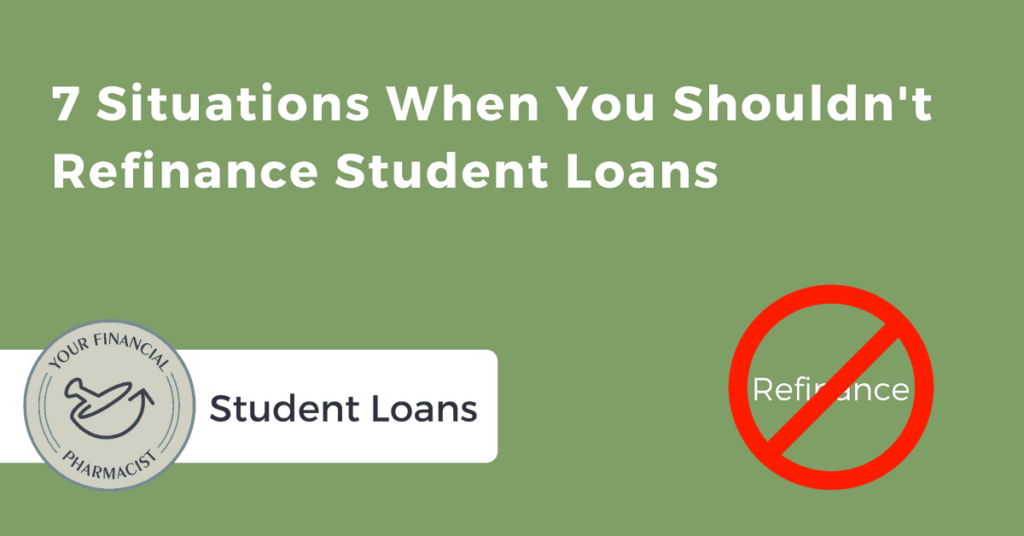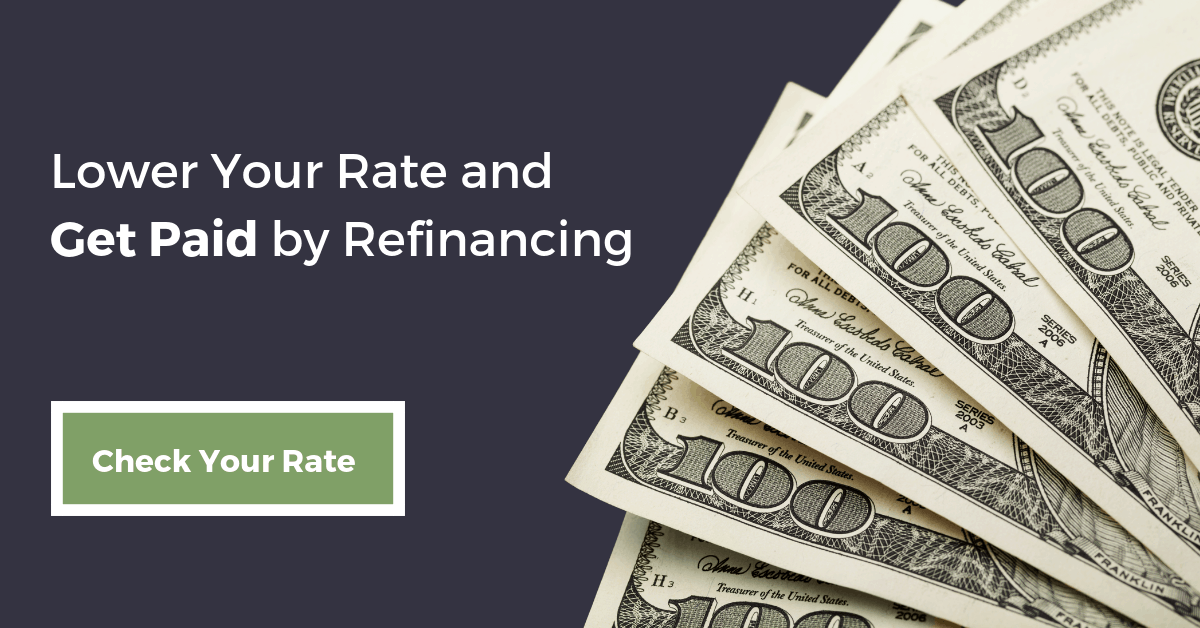The following post contains affiliate links through which YFP earns a commission.
Some posts have been floating around Linkedin recently that basically said:
“Pharmacists Should Never Refinance Student Loans!”
Never is a strong word…and sometimes it works.
Such as:
- Never drink and drive
- Never go in the sun for a prolonged period of time without protection
- Never try to eat a whole pizza before playing pick-up basketball without getting sick (I have tried this once and failed)
However, saying pharmacists should never refinance student loans is like saying someone with type 2 diabetes should never use insulin. It just doesn’t hold up.
The truth is that refinancing can be a powerful strategy to tackle your loans and can help you save a lot of money in interest. But, it’s not the best option for everyone.
Here are some situations when you should not refinance your loans.
1. You’re Pursuing Public Service Loan Forgiveness
If you work for a government organization, tax-exempt 501(c)(3) company, or a non-tax exempt non-profit (that meets qualifications), then you are eligible for the Public Service Loan Forgiveness program. This would apply to all VA and military pharmacists in addition to many working for hospitals. After making 120 qualifying payments on Direct Loans over 10 years, you can get the remaining balance of your loans forgiven. Not only are they forgiven, but they are forgiven tax-free!
Although there’s a lot controversy surrounding this program, you can’t ignore the math. Consider a single new grad that starts working for a non-profit hospital with a starting salary of $123,000 and loan balance of $160,000 with a 7% interest rate. Under the 10-year standard repayment plan, this pharmacist would pay $1,064 per month and a total of $383,214. However, if the new grad is in the PSLF program making 120 income driven payments that range from $874 to $1,404 through the PAYE repayment plan, the total amount paid would only be $134,564.
Refinancing your loans when you’re eligible for PSLF could be a $250,000 mistake. For more information on the PSLF program check out episode 18 of the podcast.
2. You’re Seeking Forgiveness After 20-25 Years
Did you know that you can get your federal loans forgiven after making payments for 20-25 years? This is another strategy to get rid of your loans outside of the public service loan forgiveness program. With non-PSLF forgiveness, there is no employment requirement. However, you must have Direct Loans and make qualifying income-driven payments every month for 20 years under the PAYE or IBR new repayment plan or 25 years through the REPAYE plan. In addition, you will be taxed on any amount forgiven after that time period which is one key difference from PSLF. This strategy typically works best for someone with a very high debt to income ratio (such as 2:1 or higher). Just like PSLF, you cannot refinance your loans or you automatically disqualify yourself from the program.
3. You Anticipate a Reduction in Your Income
One of the biggest benefits of the federal loan program is the ability to temporarily stop making payments either through deferment or forbearance. If you’re faced with unexpected medical expenses or other financial difficulties, getting a break on your student loan bill can be a welcomed short-term remedy.
While many life situations could affect your income and arrive unexpectedly, there are some that you may see coming. For example, do you plan on making a job change or transition that would result in a gap in employment? Do you plan on having a family or have a spouse or significant other that will be stepping away from work to take care of children? If one of these life events is on the horizon, you may want to hold off refinancing as not all companies offer a forbearance program.
Another situation where it could be tough to commit to refinancing is if you have variable income. While most pharmacists will have some base salary, you could have variable income especially if you own your own business. Maybe most months you could make the payments per the proposed refinance terms but what if you have a bad month? If your loans are in the federal system you can make income-driven payments and also have the option to temporarily put your loans in forbearance. This could be a huge benefit and may not be worth giving up.
Advertising Disclosure
4. You Can’t Get a Better Interest Rate
I think this one is kind of a no-brainer, right? Why would you refinance your loans if it doesn’t save you money? In some cases, people could be enticed by cash bonuses to refinance their loans, and, yes, it can be a quick way to get a few hundred bucks. However, if you’re not saving money over the course of the loan in interest, then it really doesn’t make sense to refinance.
If you can’t get a lower rate you should figure out why. You may already have a very competitive rate that can’t be beaten especially if you refinanced once already. If you still have federal loans and can’t get a lower rate, it may be because of your credit score or that you have a very high debt to income ratio.
Just because you can’t get a better rate today doesn’t mean this will be the case in the future. Because interest rates and your financial situation can change, consider rechecking in a few months if you’re confident that refinancing is a good move.
5. The Refinanced Terms Would Compromise Your Budget
The shorter the refinanced term, the lower the interest rate will be most of the time. While some people refinance their student loans to lower their monthly payment, you could actually significantly increase your payment depending on your current repayment plan. For example, let’s say you just started making monthly payments of $1,857 under the 10-year standard repayment plan for a balance of $160,000 at 7% interest. If you refinance to a 5-year term with a 5% interest rate, your monthly payment would go up to $3,019. Depending on your situation, that could be a tough payment to pay every single month making it difficult to cover living expenses and allocate money toward your other financial goals.
Being aggressive and paying off your loans quickly can be a great move, but if it compromises your budget and puts you in a vulnerable position, it may not be the right time to refinance. If the only way to get a better interest rate is to choose a shorter-term that results in tight monthly payments, consider paying down the loan first and then revisit the option to refinance when the payments would be more manageable.
Here is a calculator to see if the terms would make sense in your situation:
6. You Can’t Get Approved by a Reputable Company
Unfortunately, several companies have been found guilty of student loan scams and have questionable business practices. In fact, I have personally seen this as my wife was sent letters that looked very enticing but were definite scams once you read the fine print.
If you do refinance, make sure it’s with a company you can trust. You check out the Better Business Bureau which sets the standard for marketplace trust. You can search companies, check their ratings, and read reviews and complaints made.
If a company is asking for a fee upfront prior to refinancing, this is a major red flag and could be a scam. It’s a very competitive market and many companies offer a nice cash bonus for your business since you will pay them money in interest over the term of the loan.
Besides an origination fee, make sure there is no prepayment penalty. Refinance companies make the most money from you if you carry your loan to the full term. However, if you want to be aggressive and pay your loans off sooner than the term, there should be no fee or penalty. Most reputable companies do not have a prepayment penalty if you choose to pay off your loans early. If you want to see your savings by making extra monthly payments or a one-time lump sum payment on your student loans or other debt, check out our early payoff calculator.
7. You Don’t Have Adequate Life and Disability Insurance
Not all refinance companies discharge your loans if you die or become disabled. This is one of the protections you could lose if you move your loans out of the federal system. If you die without this protection, your executor will have to pay off the debt from your estate prior to your beneficiaries receiving any of your assets. If you become disabled and can’t make the payments, you will likely be sued by the company to recoup the remaining balance.
Be sure to know what the terms are before you commit. You can check out a detailed view of the six lenders we partnered with to see which ones will discharge your loans on death or disability here.
If you choose a company that doesn’t have this benefit because they offer better rates, then you should have these policies in place. You can quickly get free quotes from multiple companies with Policygenius, an online independent broker that has an easy-to-use interface with outstanding customer service.
8. You Have Federal Loans That Are Included in the CARES Act
Under the CARES Act, payments for qualifying federal loans will be suspended through December 31, 2022, and this should be done automatically by your servicer without having to make any requests. Qualifying loans include:
- Direct Federal Loans (Direct Subsidized, Direct Unsubsidized, Direct Consolidation Loans)
- Federal Family Education Loans (FFEL) and Perkins Loans owned by the Department of Education
In addition to payments being suspended, no interest will accrue during this time. Because of these benefits, refinancing is not a good move in general during this time. That’s because private lenders are not likely going to offer the same relief which could be problematic especially if your income has been affected. For more information, check out this post 9 Financial Questions Pharmacists Need to Answer During the COVID-19 Pandemic.
When none of these situations apply and you’re committed to taking down your loans, refinancing is a powerful strategy and can save you thousands in interest.
Current Student Loan Refinance Offers
[wptb id="15454" not found ]
Recent Posts
[pt_view id=”f651872qnv”]










